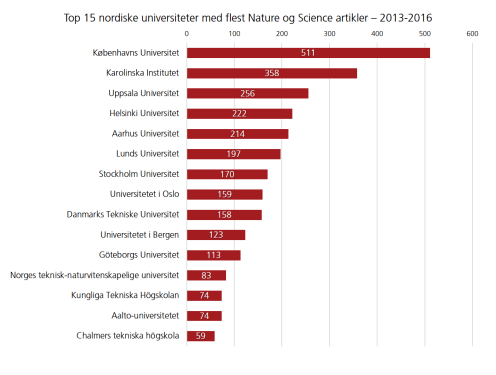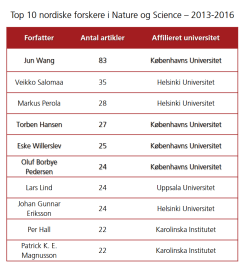News
University of Copenhagen blazes the Nordic path in Nature and Science
This article is more than 8 years old.
Researchers from KU authored or co-authored 511 scientific articles in the two prestigious journals

KU, Aarhus U and DTU were all in the top 10 (photo: Pixabay)
When it comes to publishing the most articles in the world’s leading scientific journals Nature and Science, the University of Copenhagen (KU) leads the way in the Nordics, according to figures from the database Web of Science.
From 2013-2016, researchers from KU authored or co-authored 511 scientific articles in Nature and Science, significantly more than the 358 articles contributed by the Swedish medical university Karolinska Institutet, which was second.
“Nature and Science are the most influential scientific journals in the world and if you can have a presence there, then you are part of the international research elite,” said Thomas Bjørnholm, the prorector for research and innovation at KU.
“So it instils great pride to see how much we matter in the Nordics. It’s down to the successful establishment of a number of research pillars. It’s great that KU is at the forefront of the research race.”
Other Danish universities to make it in the top 15 included Aarhus University in fifth place with 214 articles published and the Technical University of Denmark (DTU) coming in ninth, with 158 articles published.
Uppsala University (Sweden) came in third (256 articles), followed by Helsinki University (222 articles), while just a stone’s throw away across the Øresund Bridge, Lund University came sixth with 197 articles. See the complete top 15 in the image below.
READ MORE: Danish researchers help reveal heightened Arctic melting
Attracting the best
One of the individuals KU can thank for its leading position is Jun Wang, a professor from the Department of Biology, who has been particularly productive over the past few years.
Wang leads the way on the most published Nordic researchers in Nature and Science by quite some distance with 83 articles published. Second-placed Veikko Salomaa from Helsinki University was way back, with 35 articles.
“Affiliating Jun Wang is a good example of what it takes to be the leader of the pack, so we must make ourselves attractive for the most promising research talents,” said Bjørnholm.
“It required a targeted effort to attract Jun Wang to Copenhagen and such a focus will also help support and develop our entire local talent pool.”
Other Danish researchers to crack the top 10 most productive Nordic researcher list were KU professors Torben Hansen (4th), Eske Willerslev (5th) and Oluf Borbye Pedersen (6th). KU’s top four accounted for 159 of the 511 articles published in Nature and Science from 2013-2016.
Graphics below by KU












































